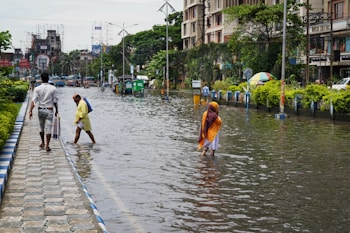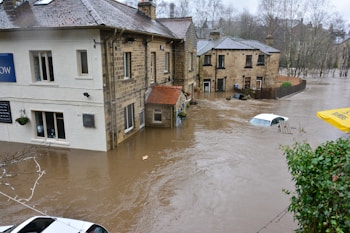 Learn Spanish: Environmental Problems & Natural Disasters
Learn Spanish: Environmental Problems & Natural Disasters
An introduction to Spanish vocabulary and phrases focused on environmental problems and natural disasters. Suitable for beginners.
energía alternativa
The Spanish phrase 'energía alternativa' directly translates to 'alternative energy' in English. It refers to energy sources that are cleaner and more sustainable than traditional forms of energy, such as fossil fuels. Alternative energy includes sources like solar power, wind power, hydroelectric power, and bioenergy. Using alternative energy can help to reduce carbon emissions and combat climate change.
Example sentences with energía alternativa →energía eléctrica
The Spanish term, 'energía eléctrica', translates to 'electric power' in English. Electric power is a form of energy that involves the flow of electric current from one point to another, which can be harnessed to do work, such as powering machines, devices, or home appliances. Thus, when referring to 'energía eléctrica' in a Spanish context, one could be discussing topics related to electricity supply, usage, or even electric power generation.
Example sentences with energía eléctrica →energía eólica
Energía eólica is a Spanish term that translates to 'wind energy' in English. This term is used to describe energy that is generated from the wind, a renewable and clean source of power. The mechanics of this process usually involve large turbines or windmills that are placed in areas with high wind activity. As the wind blows, it moves the blades of these turbines, enabling the generation of electricity.
Example sentences with energía eólica →energía nuclear
The Spanish term 'energía nuclear' translates to 'nuclear energy' in English. Nuclear energy is a type of power made by using nuclear reactions. It's generated when the nuclei of atoms are split or fused, creating a large amount of energy. This power is harnessed in nuclear power plants for electricity. Although nuclear energy is efficient and produces a lot of power, it can also be dangerous, as seen in nuclear disasters like Chernobyl.
Example sentences with energía nuclear →energía solar
The term 'energía solar' in Spanish translates to 'solar energy' in English. Solar energy is energy from the sun that is converted into thermal or electrical energy. It is the cleanest and most abundant renewable energy source available, and the U.S. has some of the richest solar resources in the world. Solar technologies can harness this energy for a variety of uses, including generating electricity, providing light or a comfortable interior environment, and heating water for domestic, commercial, or industrial use.
Example sentences with energía solar →entrar en erupción
The Spanish phrase 'entrar en erupción' directly translates to 'entering into eruption' in English. However, it is more commonly used to signify 'erupting' in a similar context as a volcano erupting. It can also be used metaphorically to describe situations where emotions or actions suddenly burst out or intensify dramatically.
Example sentences with entrar en erupción →erupción volcánica
The Spanish term 'erupción volcánica' translates to 'volcanic eruption' in English. This refers to the explosion or violent release of substances from a volcano, such as hot magma, gases, ash, and rock fragments. In a larger context, it can be associated with various geological phenomena and natural disasters. This term is commonly used in physical geography and earth science discussions. Learning its English counterpart aids in better understanding and communication in these fields.
Example sentences with erupción volcánica →exponerse a la radiación solar
The Spanish phrase 'exponerse a la radiación solar' is translated into English as 'exposure to solar radiation'. This term relates to the process or condition of being subjected to solar rays or sunlight, which can potentially have harmful effects such as sunburn, skin damage, or even skin cancer. It is frequently used in health and environmental contexts, often when discussing the importance of protective measures such as using sunscreen, wearing protective clothing, or limiting time spent under direct sunlight.
Example sentences with exponerse a la radiación solar →
extinguir(se)
The Spanish word 'extinguir(se)' translates to extinction(s) in English. The word is a verb and can be used in various contexts but primarily it represents the termination of species or occurrence of a particular entity or phenomenon. It can also be used reflexively as 'extinguirse'. For instance, in the sentence 'Las llamas se extinguieron rápidamente', it translates to 'The flames went out quickly'.
Example sentences with extinguir(se) →extinguirse (un volcán)
The term 'extinguirse (un volcán)' in Spanish refers to the event when a volcano becomes extinct. An extinct volcano is a volcano that scientists consider unlikely to erupt again. Volcanoes can become extinct when the lava supply to the magma chamber is cut off or when the volcanic conduit caves in. This process in Spanish is referred to as 'extinguirse'.
Example sentences with extinguirse (un volcán) →filtrar el agua
The Spanish phrase 'filtrar el agua' translates to 'filter the water' in English. This phrase could be related to a water purification process where impurities are removed from water by a fine physical barrier, a chemical process, or a biological process. It could also be used metaphorically in different contexts where something needs to be sifted out or separated from a mixture.
Example sentences with filtrar el agua →filtrar los residuos
The Spanish phrase 'filtrar los residuos' translates to 'filter waste' in English. It's often used in the context of environmental conservation or industrial practices where unwanted materials are separated from the desirable ones via a process known as filtration. This phrase is common in the realm of waste management and water treatment, similar to how it would be used in English.
Example sentences with filtrar los residuos →huracán
The Spanish word 'huracán' translates to 'hurricane' in English. A hurricane is a severe storm that occurs in the Atlantic or northeastern Pacific Ocean. It forms in the sea, often in the tropics, and is characterized by its strong, destructive winds, heavy rainfalls, and potentially devastating coastal flooding. The word 'huracán' itself is used in Spanish-speaking countries to refer to such storms. It is also the basis for the English term. This word is a common example of a term that is universally recognized across different languages due to the global nature of such natural disasters.
Example sentences with huracán →impacto medioambiental
The Spanish term 'impacto medioambiental' translates to 'environmental impact' in English. This phrase is often used in contexts of discussing the effects, positive or negative, that human actions or natural events can have on the environment or ecosystem. The 'environmental impact' can be evaluated in terms of its scale or severity and it frequently informs strategies for conservation or sustainable development.
Example sentences with impacto medioambiental →
incendiar(se)
The Spanish word 'incendiar(se)' primarily denotes the act of intentionally setting fire to property, which is typically illegal and destructive in nature. This word can be used both in its reflexive form 'incendiarse', meaning to catch fire, as well as in its non-reflexive form 'incendiar', meaning to set fire. In English, this term is commonly referred to as 'arson'.
Example sentences with incendiar(se) →
incineradora
The Spanish word 'incineradora' translates to 'incinerator' in English. An incinerator is a device used mostly in waste treatment technology, especially in the disposal of solid waste materials. It involves the combustion of waste products converting them into ash, flue gas, heat, or steam. In Spanish, when you say 'incineradora', it can refer to the same device or system used in waste management and disposal.
Example sentences with incineradora →
inundación
The Spanish word 'inundación' translates to 'flooding' in English. This is a noun that describes an excess of water submerging land that is usually dry. It is often linked to heavy rainfall, natural disasters, or overflow of water bodies such as rivers or lakes. 'Inundación' is typically used in the context of natural disasters or extreme weather conditions.
Example sentences with inundación →
inundar(se)
The Spanish verb 'inundar(se)' is translated as 'to flood' or 'to flood oneself' in English. This word is generally utilized when a large amount of water overflows onto typically dry land. 'Inundar' is the regular form, but 'inundarse' is the reflexive form, which transmits the idea of 'to flood oneself', insinuating that the subject of the sentence does the action to itself. This can be used figuratively to indicate overwhelming situations or feelings that flood over a person, in addition to the literal flooding of water.
Example sentences with inundar(se) →litoral protegido
The term 'litoral protegido' in Spanish translates to 'protected coast' in English. This phrase is used to describe a coastal area that has been designated as a protected zone. In these areas, certain laws or regulations are typically enforced to prevent activities that could harm the environment, wildlife, or natural resources. These may include restrictions on construction, fishing, or tourism. The aim of a 'litoral protegido' is to conserve the unique rule of the coast, preserving biodiversity and promoting sustainable practices.
Example sentences with litoral protegido →litoral virgen
The Spanish term 'litoral virgen' translates to 'virgin coast' in English. This is a phrase used to describe sections of a coastline that remain undisturbed and untouched by urban development or tourism activities. It retains its natural landscape and does not have infrastructure like hotels, roads or stores, preserving the native flora, fauna, and overall natural beauty. This type of untouched or undeveloped coastal area is often protected because of its high environmental value.
Example sentences with litoral virgen →marea negra
The word 'marea negra' translates to 'black tide' in English. It is often used within the context of ecological or environmental discussions where it refers to an oil spill, specifically in the ocean or sea. Oil spills are often described as 'black tides' due to their authority in covering vast expanses of water and the black color that is characteristic of oil. This term serves as a metaphorical description for this environmental disaster.
Example sentences with marea negra →
maremoto
The Spanish word 'maremoto' translates to 'tsunami' in English. It's a natural disaster involving a series of waves in a water body caused by the displacement of a large volume of water. These can have disastrous effects when they reach land, causing large-scale devastation and loss of life. The word 'maremoto' is used in Spanish-speaking countries to refer to this natural event.
Example sentences with maremoto →movimiento sísmico
The Spanish phrase 'movimiento sísmico' refers to what is commonly known as 'seismic movement' in English. This term is primarily used in the field of geology and earth sciences to denote the movement of the Earth's crust caused by the release of energy accumulating over time. Such movements are often the result of geological faults, volcanic activity, or other underground phenomena. The understanding and monitoring of seismic movements form a crucial part of predicting and assessing the impacts of earthquakes and other potential natural disasters.
Example sentences with movimiento sísmico →panel fotovoltaico
A 'panel fotovoltaico' is a Spanish term that refers to a 'photovoltaic panel' in English. Essentially, the photovoltaic process is what enables solar panel technologies to convert sunlight into electricity, a method widely used for sustainable, green energy production. The term photovoltaic comes from the process of converting photons (light particles) into voltage (electricity) which is achieved through the use of semiconducting materials. 'Panel fotovoltaico' therefore refers to these panels that generate and supply solar power by converting energy from the sun.
Example sentences with panel fotovoltaico →panel solar
A 'panel solar' in Spanish translates to 'solar panel' in English. A solar panel is a device designed to absorb the sun's rays as a source of energy for generating electricity or heating. It's widely used as a renewable source of energy to reduce the reliance on fossil fuels. You might see them on rooftops, on spacecraft, in remote locations, or any place where there's a need for power and traditional electric grid service is not available.
Example sentences with panel solar →papel reciclado
The Spanish term 'papel reciclado' directly translates to 'recycled paper' in English. This term is widely used in environmental spheres and refers to paper materials that have been reprocessed and turned into fresh paper products for reuse. 'Papel reciclado' involves the process of collecting used paper products, processing them into a pulp, and reconstituting them into new paper. This term grandly symbolizes the greater movement for environmental sustainability and waste reduction.

pesticidas
The Spanish word 'pesticidas' translates to 'pesticides' in English. Pesticides are substances or mixtures that are used to control, prevent, destroy, repel, or mitigate any pest ranging from insects, animals and weeds to microorganisms such as fungi, molds, bacteria, and viruses. They are often used in agriculture to prevent damage to crops but can have potential harm to humans, animals, or the environment if not used responsibly.
Example sentences with pesticidas →preservar el medio ambiente
The phrase 'preservar el medio ambiente' in Spanish translates to 'preserving the environment' in English. It signifies the important action of taking care of the natural world. This phrase can be used in a variety of contexts including discussions on nature conservation, health, climate change, and policy making. In daily life, it reminds us to make choices that are eco-friendly and sustainable, hence contributing to the preservation of our environment.
Example sentences with preservar el medio ambiente →problema medioambiental
The Spanish term 'problema medioambiental' translates to 'environmental problem' in English. The term refers to an issue or problem within the environment, predominantly caused by human activities. These problems include pollution, deforestation, and climate change, and they are generally harmful to ecosystems and biodiversity. The term is often used in discussions about the necessity of environmental conservation and sustainable practices.
Example sentences with problema medioambiental →propagar(se) un incendio
The Spanish phrase 'propagar(se) un incendio' translates as 'propagate a fire' in English. This generally means that the fire is spreading from one place to another. It's often used in contexts where fires in forests, buildings, or other situations are expanding. This can be due to various conditions such as wind, availability of flammable materials, or high temperatures. The term can be used metaphorically as well to signify the spreading of ideas or information, mirroring the way a physical fire spreads.
Example sentences with propagar(se) un incendio →